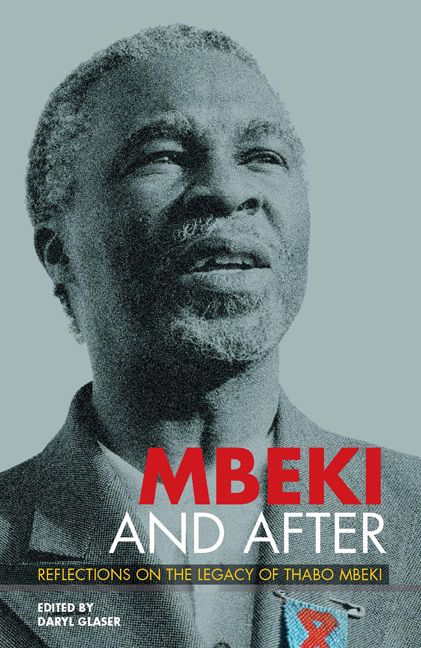Book contents
- Frontmatter
- Contents
- Acknowledgements
- Acronyms
- General Reflections
- 1 Mbeki and his legacy: A critical introduction
- 2 Mbeki's legacy: Some conceptual markers
- 3 Why is thabo mbeki a ‘nitemare’?
- The Mbeki Style Of Governance
- Mbeki And Society
- Mbeki And Race
- Mbeki Abroad
- Notes
- Contributors
- Bibliography
- Index
3 - Why is thabo mbeki a ‘nitemare’?
from General Reflections
Published online by Cambridge University Press: 21 April 2018
- Frontmatter
- Contents
- Acknowledgements
- Acronyms
- General Reflections
- 1 Mbeki and his legacy: A critical introduction
- 2 Mbeki's legacy: Some conceptual markers
- 3 Why is thabo mbeki a ‘nitemare’?
- The Mbeki Style Of Governance
- Mbeki And Society
- Mbeki And Race
- Mbeki Abroad
- Notes
- Contributors
- Bibliography
- Index
Summary
In October 2009 I was invited attend a performance of Mbeki and Other Nitemares, a play written and directed by Tsepo wa Mamatu, and performed by his students at the Wits University Drama School. The play was an unsettling mix of two genres: in part a biographical narrative of Thabo Mbeki's life, in part an acute satire of contem - porary South African politics. On the one hand there was almostsentimental nostalgia for Mbeki's biography; on the other a hard-edged (and often very funny) fury – not just at Mbeki himself, but at the politics unleashed by his downfall.
The play expands the few days it took Mbeki to resign after he was ‘recalled’ into a Lear-like eternity wherein Mbeki is faced with the consequences of his actions and his audience is to confront its collusion with the politics of power as represented by the current-day ANC.
At its climax, the play's auteur-figure, a middle-class youth leader, confronts the audience from within a literal cage. His words carry the ambivalence of the iconic freedom song Senzeni Na?: ‘What have we done to deserve this?’ but also ‘What have we done?’
The play itself becomes the escape-vehicle with which the writer and his cast free themselves from the constraints of their own political heritage, by articulating an agency and identity beyond allegiance to the ANC. And in so doing, they force their audience to confront – as Mbeki's downfall has – the reality that we are ruled not by saints, but by flawed men who are subjective beings rather than noble avatars of struggle, and who act in their own interests rather than, necessarily, those of their people. Such consciousness appears to be Mbeki's greatest – unwilled – legacy to South Africa: he seems to have ushered us into a very necessary coming of age; an era of realpolitik where we find ourselves unshackled, at last, from the redemptive fantasies of the liberation era.
And yet, when chatting with the cast for a couple of hours afterwards, over drinks in the Wits Theatre bar, I came to understand more deeply another element of Mbeki's legacy; one which suggests a continuation of the redemptive impulse in South African politics.
- Type
- Chapter
- Information
- Mbeki and AfterReflections On The Legacy Of Thabo Mbeki, pp. 51 - 68Publisher: Wits University PressPrint publication year: 2009



